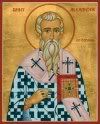Today is the commemoration of St. Aleksander of Comana my patron so here is his story from the Prologue:
SAINT ALEXANDER, BISHOP OF COMANA
Men look upon clothes and the face,
But God looks at the soul and the heart.
Glorious Alexander, a charcoal-burner, was,
With the charcoal-burner, the body is blackened
And from soot, which water cleanses,
In the sinner, the heart is darkened
Which only the fire of faith can cleanse
The fire of faith and the cry of repentance.
It is easier to cleanse the skin of a charcoal-burner
Than the blackened heart of a sinner.
Alexander, with humility, covered
In a cave concealed, as a hidden flame
For laughter, to the gullible world, he was.
The world did not see; Gregory saw,
With an acute spirit, the charcoal-burner discerned
And in him, found a saint,
In the dark cave, a beautiful flame,
Beneath the mask of insanity, great wisdom,
Beneath the dirty soot, a pure heart,
A royal soul in decayed rags.
That the light be hidden, the Lord does not permit,
At the appropriate time, the light proclaims,
For the benefit and salvation of men.
All is wonderful, what God judges.
THE PRIESTLY-MARTYR ALEXANDER, BISHOP OF COMANA
As a simple charcoal-burner, Alexander lived in the town of Comana near Neo-Caesarea. When the bishop of Comana died, St. Gregory the miracle-worker and Bishop of Neo-Caesarea (November 17) was then called to preside at a council to elect a new bishop. Both clergy and laymen alike were present at the council. However, the electors were unable to agree on one person. At the time of evaluating a candidate, they all primarily paid attention to the points of his externals: external dignity and behavior. St. Gregory then said that they need not look so much at the external characteristics as much as at the spirit and spiritual capabilities. Then some jesters mocking cried out: then we should elect Alexander the charcoal-burner as our bishop! General laughter then ensued. St. Gregory asked: "Who is this Alexander?" And, thinking that his name was not mentioned at this council without God's Providence, Gregory ordered that Alexander be brought before the council. As a charcoal-burner, he was completely soiled and in rags. His appearance again evoked laughter in the council. Gregory then took Alexander aside and made him take an oath to speak the truth concerning himself. Alexander said that he was a Greek philosopher and that he enjoyed great honor and position but that he rejected all, humbled himself and made himself to be a "fool for the sake of Christ" from the time when he had read and understood Holy Scripture. Gregory ordered Alexander bathed and clothed in new attire and, with him, entered the council and before all began to examine Alexander in Holy Scripture. All were amazed at Alexander's wisdom and words of grace and could hardly recognize in this wise man, the former quiet charcoal-burner. Alexander was unanimously elected bishop. By his sanctity, wisdom and goodness, he gained the love of his flock. Alexander died a martyr's death for Christ during the reign of Diocletian.
Learn to respect and to love the lowly and simple people. Such as these are the most on earth: such as these are the most in the Kingdom of Heaven. In them, there is no pride, i.e., the basic madness from which the souls of the rich and the powerful of this world suffer. They carry out their duty in this world perfectly and yet it appears to them amusing when someone praises them for it, while the self-seeking men of this world seek praise for all their work and often, it is imperfectly completed. St. Alexander was an eminent philosopher and he left everything, hid himself from exalted society, the praise of the world and mingled with the lowliest and the simplest of men, as a charcoal-burner among charcoal-burners. Instead of former praises and honors, he endured with rejoicing that children ran after him and laughed at him because of his sootiness and raggedness. However, Alexander was not the only one who liked to live with the lowly and simple. Many kings and princes, learning of the sweetness of Christ's Faith, removed the crowns from their heads and fled from aristocratic vanity to be among the simple people. Did not He alone, the King of Kings, the Lord our Christ appear among shepherds and fishermen? St. Zeno counsels: "Do not choose a glorious place for living and do not associate with a man of a prominent name."
Subscribe to:
Post Comments (Atom)


3 comments:
This is excellent. Thank you.
Sorry I missed your feast day Duke. Hope it was exceptional. See you soon!
It was incredible...
Post a Comment